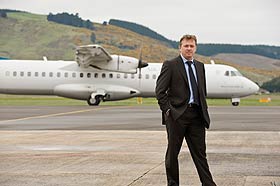
 Associate Professor David Timothy Duval
Associate Professor David Timothy Duval
"We're planning to put together a picture of what's happening in the international aviation environment and what it means for New Zealand's tourism sector ..."
Fundmental questions, such as what factors airlines consider when adding or reducing flights to New Zealand, are to be examined under a FRST grant secured by Associate Professor David Timothy Duval (Department of Tourism).
The three-year project, with partners Covec (a consultancy firm) and Dr Niven Winchester (Department of Economics), will examine the links between New Zealand's tourism sector and the global aviation industry.
Duval says the project will dissect the structure of air links into New Zealand and take an in-depth look at the operational environment and regulatory framework, so that they can identify policy drivers and help reduce risk and uncertainty in air service provision. He says the first year will look at the operational conditions faced by airlines operating to, from and within New Zealand.
"Airlines today have to contend with turbulent operating conditions. Examples include fluctuating unit costs as a result of volatile oil prices, recent slumps in demand and declining unit revenue as a result of the global recession and H1N1 influenza, and concerns on the global stage over emissions. As a result, their business models are constantly being revised and reshaped to match market conditions.
"These factors and, indeed, many others affect the strategic decision of any airline to offer air services to a country like New Zealand. What is not well understood in the New Zealand context is how these factors can ultimately shape capacity, route structure and even pricing. "We are potentially quite vulnerable, but at the same time we need to be able to identify the opportunities where we can punch above our weight in securing valuable air services." Duval says the second year of research will look at the policy and regulatory environment – or aeropolitics – that affects market access for airlines.
"Over and above whether there is strategic intent for an airline to begin services to New Zealand, that access is provided for by agreements between New Zealand and numerous other countries. "In fact, all commercial air access to New Zealand is governed, in one way or another, by a series of often complex air service arrangements, some of which are quite liberal in terms of the amount and frequency of access that they provide for," he says.
"The negotiation of these arrangements determines the ability of international airlines to provide services into New Zealand – and New Zealand's policy of openness is well known." The research will review the policy environment and help policymakers shape future air service arrangements, and it will also help the tourism sector understand how the regulation of access can impact tourism.
"This extends from the factors that shape optimal policy of access for the benefit of tourism and the wider economy, to the social and economic interest held in New Zealand's air services infrastructure by different users."
The third year of the project will focus on the value of services by using the information gathered to help construct a dynamic model of the New Zealand economy. The model will be used to test how different changes impact the New Zealand tourism sector: for example, a carrier altering its services or a pandemic.
"At the end of three years, we're planning to put together a picture of what's happening in the international aviation environment and what it means for New Zealand's tourism sector, especially in terms of long-term planning and policy responses."
Duval has established a Centre for Air Transport Research in the School of Business that will house the project (http://catr.otago.ac.nz) and seek to build research capacity at Otago in the area of commercial air transport research.
Funding
- Foundation for Research, Science and Technology
